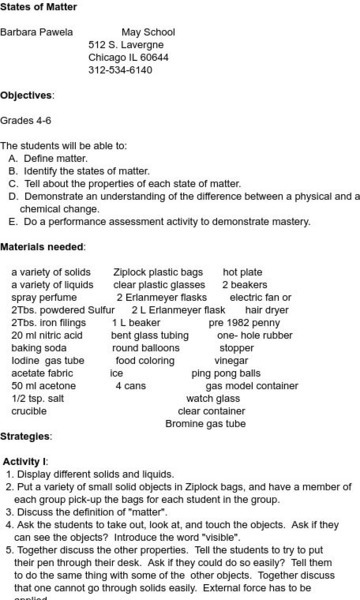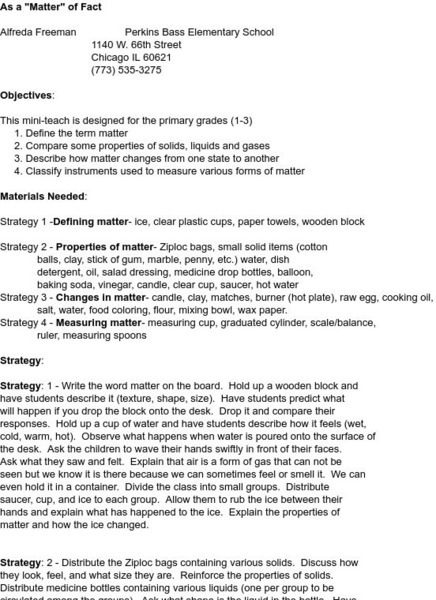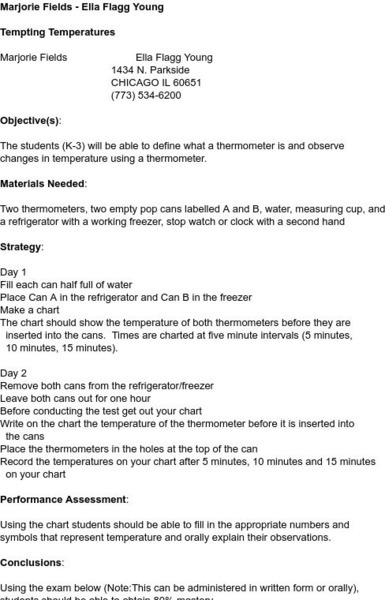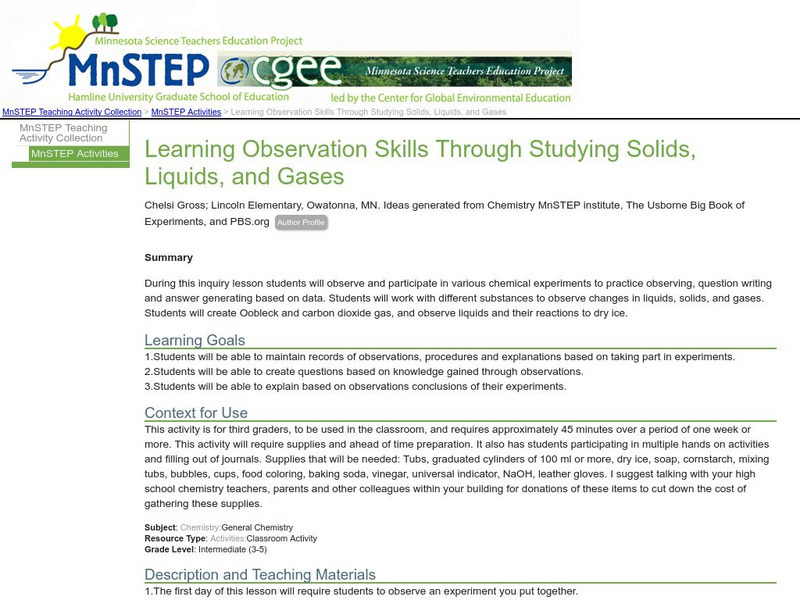Hi, what do you want to do?
Better Lesson
Better Lesson: Changing Matter:changing Matter: Is Weight the Same or Different?
Students conduct a hands-on investigation to determine how matter, changing state, effects the property of weight. Students will collect data and graph their results. Resources include step by step instructions, a data worksheet, videos...
American Chemical Society
Middle School Chemistry: Changing State: Freezing
Students investigate how low temperature causes water vapor to condense into a liquid and then freeze to form a solid.
Children's Museum
The Children's Museum of Indianapolis: Color Changing Milk
Students observe a molecular dance of bursting colors through exploring states of matter and learning that materials can be characterize by how they respond to water.
Utah STEM Foundation
Utah Stem Action Center: Changes in Matter
The goal of this activity is to develop and use a model to describe that matter is made of particles on a scale that is too small to be seen. You will be making observations of changes supported by a particle model of matter.
Science and Mathematics Initiative for Learning Enhancement (SMILE)
Smile: States of Matter
A comprehensive lesson plan site that contains a number of activities to aid in teaching about the states and properties of matter and the difference between a physical and chemical change.
Science Education Resource Center at Carleton College
Serc: Freezing and Phase Change: How Do You Make Ice Cream?
Learners will be expanding a study of phase changes after experiences with exploration of the three phases of matter. They apply what they have learned through freezing water and create a tasty ice cream treat.
Alabama Learning Exchange
Alex: What's the Matter: Concentration Game
What's the Matter? is a guided inquiry lesson plan on classification of matter, physical and chemical properties, and physical and chemical changes. There are two parts to this lesson plan: (a) concentration game for definitions and (b)...
University of Florida
Florida Museum of Natural History: Kitchen Science
This guide focuses on everyday substances and how we can change their properties by adding heat or cold, physically manipulating them, or mixing them together.
American Chemical Society
Middle School Chemistry: Chapter 2: Changes of State
Five chemistry lessons about phase changes between the states of mattter complete with handouts and animations.
Science Education Resource Center at Carleton College
Serc: Investigating Changes of State: Chemical and Physical Changes
In this chemistry lab, students will investigate, observe, and describe a variety of chemical and physical changes in matter. They will understand that this is part of everyday life.
Science Education Resource Center at Carleton College
Serc: Observing the Effect of Temperature on Change of State and Gas Pressure
This lab serves as a short introduction to both changes in state and air pressure/the gas laws. The students will heat a small amount of water in an aluminum can. They will then invert it in a bucket of cold water and crush the can using...
Utah Education Network
Uen: Adding Heat
Observe the changes in the states of matter and volume when a balloon-covered flask with water in it is heated.
ArtsNow
Arts Now Learning: Be One With the Water [Pdf]
Fourth graders will explore states of matter and the water cycle by bringing water to life with their bodies. By enacting the changes that water molecules experience, 4th graders will learn scientific information kinesthetically.
Other
Howto smile.org: From Gas to Liquid to Solid
Allow your learners to explore states of matter as they learn what causes frost to form on the outside of a cold container. Students will observe how liquid water can change to ice or water vapor in this lab. Lesson includes background...
Science and Mathematics Initiative for Learning Enhancement (SMILE)
Smile: As a "Matter" of Fact
In this lesson plan site, students will define matter and compare properties of solids, liquids and gases.
Other
Rooted and Growing: Kindergarten Science Unit: Objects and Materials [Pdf]
A collection of science lessons where students explore the characteristics of different materials and everyday objects and create their own objects and art. They study the properties of the materials that make them strong, absorptive,...
Science Education Resource Center at Carleton College
Serc: Polymers & Plastics: Classification & Models
Students will use their prior knowledge about changes of matter including physical and chemical changes to examine and categorize various types of plastics (polymers). They will identify how their chemical properties allow them to have...
Science and Mathematics Initiative for Learning Enhancement (SMILE)
Smile: Somethin' Sweet
This site provides a lesson plan using candy making to demonstrate physical and chemical changes in matter. Includes directions to make caramel and rock candy.
NC State University
The Engineering Place: Silly Stuff
An investigation into change of state where students make silly putty.
NC State University
The Engineering Place: Ice Cream in a Bag
An investigation into change of state where students prepare small bags of ingredients and shake them within a bag of ice and salt to see if they can make ice-cream. As they progress, they apply the scientific method.
Science and Mathematics Initiative for Learning Enhancement (SMILE)
Smile: Tempting Temperatures
In this lesson plan students learn how to use a thermometer and compare changes in temperature using water in the fridge and water in the freezer. Helps students create charts to analyze data.
Science Education Resource Center at Carleton College
Serc: Learning Observation Skills Through Studying Solids, Liquids, and Gases
During this lesson, students will practice observing, question writing, and answer generating based on taking part in experiments. Students will work with different substances to observe changes in liquids, solids, and gases.
Alabama Learning Exchange
Alex: Save a Buck Challenge
Our pipes leak, air drafts push through our windows and walls, light bulbs create more heat than light, and every appliance we have stays plugged in all day long. Of course its our parents who pay the bills, so it doesn't matter. This is...




















